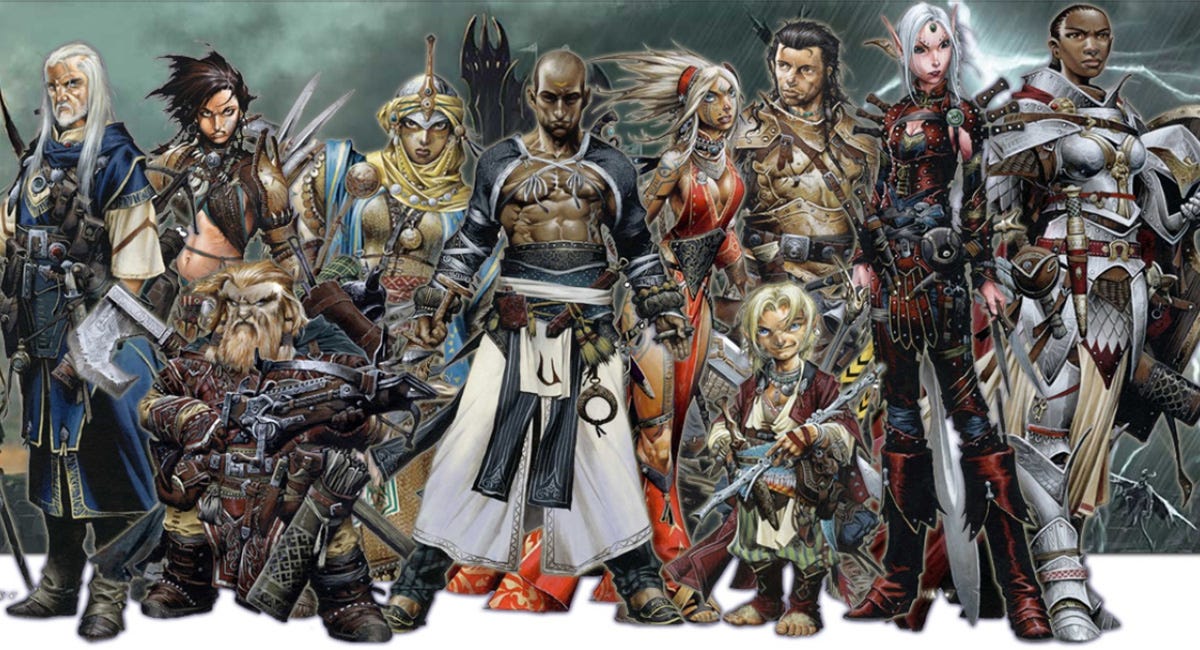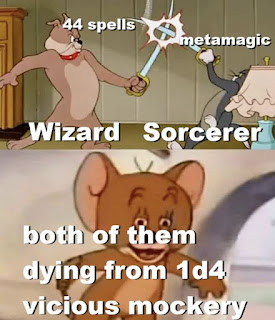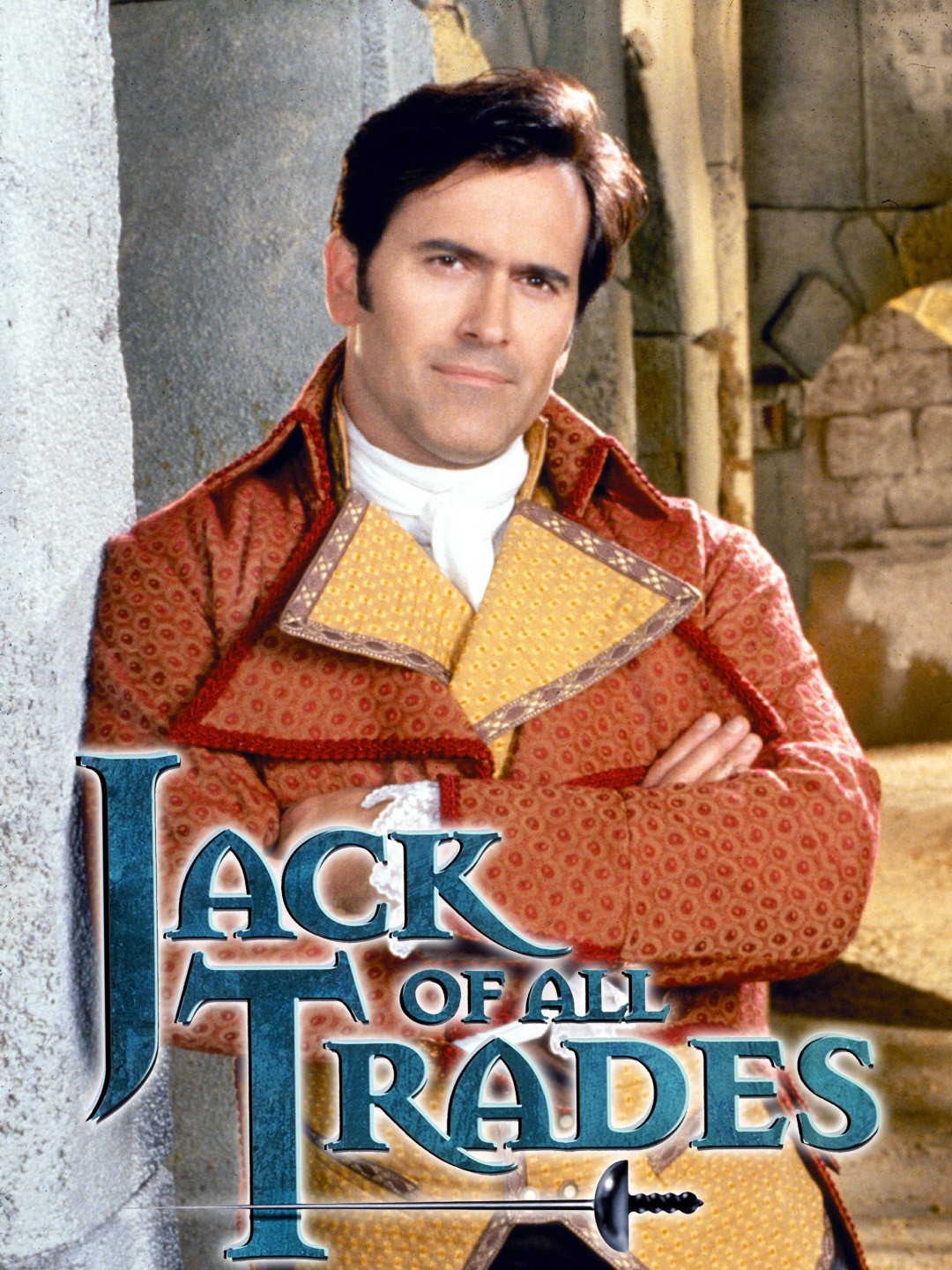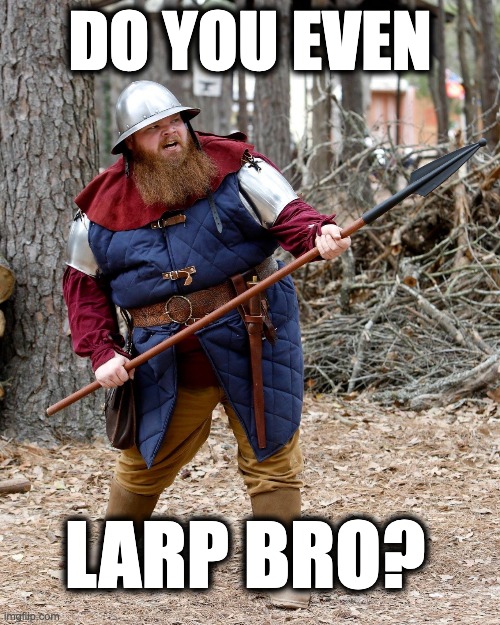Welcome back friends! Previously, we discussed the 3 macronutrients as they related to the 3 primary character archetypes in DnD: the warrior, the divine spellcaster and the arcane spellcaster. Today, we'll dive into the specific character classes that make up those archetypes and what they represent.
CHARACTER CLASSES
 |
| Like a much more awesome Avengers |
Time to get nerdy again: we’ve established effectively archetypes among the 3 macros: warriors, divine magic users and arcane magic users. But true DnD fans know that these aren’t actual character classes you can play: they’re simply the first subcategory that leads through several branching paths of character development. Among the warrior category we have Fighters, Barbarians, Paladins, Rangers and Monks, among the divine magic users one can find Clerics and Druids, and among the arcane spellcasters was have Wizards and Sorcerers (yes, there are more classes out there, I’m out of the loop with the most current editions). Outside of that, we have our rogue classes of thieves and bards (to be discussed later). All of these character classes offer their own unique build and approach to the game, and I will continue to extend the metaphor in that regards.
WARRIORS
 |
| Incomplete warriors are lacking in amino acids |
The Fighter: The fighter stands out as the prototypical warrior class. As the name implies: all they do is fight. Fighters get zero magical skills or unique natural/supernatural abilities. Instead, they are just VERY good at fighting. They can wear all the armor and wield all the weapons. As far as a protein source goes, a fighter would refer to a source that is effectively PURE protein. Egg whites, chicken/turkey breasts, piedmontese grassfed sirloin, tuna, etc.
Paladins/Rangers: Paladins and Rangers are warrior types who aren’t quite as good at fighting as the fighter, but are still really damn good at it, and their compensation is that they’re allowed access to a limited library of divine magic (among some other skills, but that doesn’t matter for our discussion). Paladins tend to get more cleric-like spells, while Rangers get more druid-like spells: clerics being holy priests and druids being nature-based divine magic users (think like a tribal healer). As far as food sources go, with the attachment of divine magic to fighting ability, we’re looking at those protein sources that come with a fat source alongside them. The majority of animal products are this way, as meat tends to have SOME fat associated with it, as do eggs and the majority of dairy products. The exception is when we process these items to intentionally remove the fats, but that’s not a natural product in turn.
If we really wanted to get weird about this, we could say that Rangers, with their affinity toward nature, represent those natural protein/fat pairings whereas the Paladin, a product of the church (a man-made institution) represents processed protein/fat products, or we could say the ranger represents wild/pasture raised/grassfed, etc animal products while the Paladin represents feedlot/industrial animal products, but that’s getting pretty nutty.
The Monk: The monk is a warrior type that specializes in unarmed and unarmored combat: effectively a master martial artist. In order to not be slaughtered in combat AND to be able to effectively punch a stone giant without breaking their hands, monks rely heavily on chi/ki: a mystical divine force that can be channeled to empower them. In this regard, the monk is practically more divine than he is a warrior, and I’d group this into those “protein” categories that are so fatty they’re almost really fat with meat attached vs the other way around. Bacon, pork belly, 70/30 ground beef, prime rib, etc.
The Barbarian: I struggle with this one, since the barbarian doesn’t really have divine magic, so they’d be “lean protein”. Perhaps I’d go the same way I went with the ranger/paladin divide, and say the fighter represents industrially produced lean protein while the barbarian represents natural lean protein (wild small game, like rabbits, so notoriously lean that they created the term “rabbit starvation”).
 |
| Hence why effective barbarians eat meat off the bone! |
Really though, the big takeaway is this: notice how NONE of these classes include a combination of ARCANE magic? It’s all divine magic. That’s because, once again: arcane magic is NOT essential for the success of the party. Meanwhile, a class that is a combination of warrior and divine magic is VERY self-sustaining. Nature recognizes this: we do NOT naturally find combinations of pure carbs and protein. At least, not COMPLETE proteins. Rice is a grain that has some protein in it, yes, but an incomplete amino acid profile: it needs to be combined with OTHER proteins before it can be complete, which is why beans and rice are so popular. Peanut butter and jelly sandwiches function because the incomplete aminos in the peanuts combine with the incomplete proteins in the bread to form a complete protein. Whereas a paladin or ranger can function very well independently, these “warrior/arcane hybrids” require an ADDITIONAL party member just to be complete.
Once again: I love how this analogy just keeps perpetuating.
DIVINE MAGIC USERS
 |
| It's the letter, not the spirt, that counts |
As I wrote previously, the divine magic users breakdown into clerics and druids. I’ve already written about the value of clerics in particular (wear heavy armor, can still bash with some weapons) and gave a slight explanation of druids in the warrior section. Instead of breaking down the unique qualities of those specific classes, let me discuss the two types of divine magic one can access: holy/natural vs unholy/unnatural.
Holy Magic: This effectively describes what I have been referring to as divine magic up until now: that which heals us and keeps us healthy. In the world of fats, these tend to be naturally occurring fats. Just from a logical standpoint, it stands to reason that the foods we can grow, hunt and eat are going to be the foods that are good for us. I DO appreciate what Dr. Robert Kiltz has to say on the subject “Plants have oils, animals have fats: eat fats”, and am inclined to support fats vs oils in the sense of eating fat from the meat of animals, fats from whole eggs, fats from dairy (cream, butter, ghee, sour cream, yogurt, cheeses, etc), but I’ve experienced success with avocados and olives as well.
 |
| This is just making me laugh too much |
Unholy Magic: Undiscussed until now is the other side of divine magic: unholy/unnatural magic, or just plain “evil”. There are members of clerical orders that are devoted toward inflicting harm rather than healing, and those that engage in dark necromancy or the spread of pestilence vs health. In the realm of fats, these are going to be your man-made fats: “unnatural fats”. Irrespective of where you stand on the nutritional spectrum, pretty much everyone, from vegan to carnivore and in between, agree that MAN MADE transfats are absolutely awful and should be avoided at all costs. Not minimized: simply zero’d out. But alongside that, consider so many man made seed oils that go through extensive processing in order to be rendered shelf-stable and purchasable, and consider alongside that the risk you put yourself in of those fats turning rancid ON said shelf compared to something you could obtain naturally. Or think of the abomination that is margarine when you could consume butter instead. And I’m going to upset a lot of folks with this one, but I’d consider nut butters/peanut butter/sunflower seed butter in this category as well. A butter made out of nuts is so absurd from a “natural” standpoint: the amount of labor you’d have to go to in order to cultivate the amount of nuts necessary to make into a butter, and then the actual laboring processing of MAKING said nut butter would at least “EARN” you the privilege of eating it ONCE, but we can just buy the stuff at the store, take a spoon to the jar and eat the whole thing in one sitting. There is a reason that stuff tastes so good: your body KNOWS it’s SUPPOSED to be a limited resource, and it wants as much of it as it can get WHEN it can get it so it can maximize its chance of survival. But when we live in abundance, this is just one more unnatural thing out there that is killing us. Things may be “natural” in that we can find them in nature, but let’s also consider the proportion and quantity that is natural as well. A handful of nuts every few days? Sure. A jar of peanut butter every evening? You have become QUITE the evil cleric.
ARCANE SPELLCASTERS
 |
| There are just SO many effective memes out there... |
Herein the metaphor continues with two distinct arcane spellcasters: wizards and sorcerers. For the briefest of overviews: a wizard is a spellcaster whose ability comes from years of studying ancient arcane texts and learning all the right incantations, motions, words, and physical components necessary to cast spells. A sorcerer, on the other hand, is born with a gift of arcane magic within their blood: they simply must learn how to master this gift to maximize their own potential.
Sorcerers: Given the natural talent of this class, it is fitting that they represent those natural carbohydrates: ones not specifically produced by man. We DO run into the issue that man is such a destructive and transformative force that much of what we encounter “naturally” these days still has the taint of man on it. Fruit tends to be much sweeter (higher in sugar), less fibrous, larger in size, etc, now than it was thousands of years ago, as we’ve taken to selectively breeding those fruits we found desirable while letting the bitter and small fruits die out. There are other such examples as well, but it’s one of the reasons that attempting the “Paleo diet” runs into issues: we cannot eat as paleo man did, for the foods we have do not reflect the foods he did. All that said, WHEN we employ arcane spellcasters, we do ourselves a favor by selecting from what is as close to natural as possible. Single ingredient foods that we can grow: simple as that. Potatoes (sweet or otherwise), fruits (in season), honey, easy to harvest vegetables (ones that do not require extensive preparation to consume), etc.
Wizards: These dusty book nerds represent “unnatural” carbohydrates: those that can only be obtained via processing. The worst offender here being, as Dan John calls them “cardboard carbs”: those carbohydrates that are near infinitely shelf-stable and tend to come packed in cardboard boxes. I’ve heard Mark Bell refer to a pantry as “a closet full of dead food”, and it put things in perspective. We already know that breakfast cereal, chips/crisps, crackers, etc are garbage, but also consider the degree of processing that goes into making a bagel, bread, many oatmeals, flour itself (or pretty much anything made of grain), etc. CAN wizards be implemented into an adventuring party? Absolutely! There have been many grand tales of wizards achieving incredible feats with a well formed party. But as the wizard is the product of YEARS of extensive studying, learning and planning, the implementation of these carbohydrates into a diet needs to be VERY focused and nuanced, if it happens at all. Whereas sorcerers are fairly simple to play, wizards NEED strategy. For some, this may mean eating some breakfast cereal post workout because the quick absorbing carbs are helpful for restoring lost glycogen and triggering and INTENTIONAL insulin spike for the sake of further anabolism in the presence of protein (which there are many studies that confirm and deny the salience of this approach), or it may mean engaging in some manner of Skiploading/Carb Cycling ala Justin Harris, but take note of how those that are able to best strategize and implement these tools are well researched, well EXPERIENCED, and, in many cases, making use of exogenous insulin to maximize the effects of these carbs. If you are playing a simple 1st level adventure against some goblins, quit trying to use a dragon slaying strategy and just go back to swinging the sword.
ROGUES
 |
| The only time you're excited to see one |
Mentioned only in passing up until this point is the class of rogues, subdivided into thieves and bards. The function of a thief is obvious within the name, but for those unfamiliar with bards: they are effectively the “jack of all trades/master of none” class, equipped with a little bit of arcane trickery, some thieving skills, some limited sword swinging, charisma, and some musical talent. Where do they fit in our adventuring party?
Thieves: Thieves, of course, steal. Some of the even less scrupulous ones will also kill. Specifically, they’ll employ their talents of silence and guile and employ that to perform covert assassinations with daggers in the back (a quite literal “backstab” ability). What are the thieves in your adventuring party? Alcohol, plain and simple. Alcohol may contain carbohydrates, but you do NOT want to employ this as a fuel source in any capacity. Alongside that, alcohol is quite blatantly a poison, and has several negatives impacts to physical transformation. It halts anabolism, promotes catabolism, harms the body, adds adipose tissues, etc etc. Can a thief be a part of an adventuring party? Absolutely: many have them. But consider that, often, the presence of a thief in a party is going to bring more trouble than benefits, and a party that does not indulge in skullduggery tends to stay out of trouble with the local constable.
Bards: As the jack of all trades and master of none, the bard represents those nutritional choices that just aren’t really great at anything but are “passable”. I’ve already spoken about incomplete protein sources found in plants, and this pretty much exemplifies the bard: you can live off of it, but you won’t thrive off of it. Beans (contains all 3 macros, not great at any of them), milk (the ONLY “natural” substance that contains rich amounts of fat and carbs paired together, and specifically because it’s meant to make babies GROW, which can be rough on adults), most vegetable proteins , etc. Typically, anytime you find a natural food that has all 3 macros in it, it’s not a great source of any of them, to say nothing of man-made foods. In fact, let’s go a little further here: up until now I’ve been discussing “good aligned” bards, but an evil bard is truly destructive, because they employ their charisma and charm as tempters, charlatans and conmen. In the nutritional world, these are all those misleading marketing hacks that have us confounded, bamboozled and sick. I was a total victim of this when it came to “keto treats”: all the frankenfoods out there that are labeled as “keto friendly” and contain so much wizardry and alchemy in them that you absolutely obliterate your digestive tract by giving it something so alien to process. And how many protein treats are out there, singing you so many wondrous songs about their “perfect marcos”, all achieved with “net carb magic” based off an influx of corn fiber and other cheap, destructive fillers when you could have simply eaten some eggs. You can take something pure and simple like a strained yogurt and add so much junk to it you remove any healthful benefit to it. Be on the lookout for evil bards, and, in general, just stay away from this class unless you’re REALLY in a bind.
 |
| I just wanted to get in another Bruce Campbell photo |

Today i learned that i am some sort of wizard cleric fighter multiclass
ReplyDeleteIt sounds more like your adventuring party has those classes in them, unless you are meaning to tell me that you are food. But even then, unless you are VERY diabetic, I cannot imagine you are very rich in carbs.
DeleteI have those classes in my party is what i meant, haha.
DeleteI think this is the only time I've ever taken issue with your writing: you have likened my favorite character class (Rogue) to the only nutritional category that I have empirically determined to be worse than useless, to me (alcohol).
ReplyDeleteBackstab, man. Although I was told recently that dates me.
Hah! In true form, a Rogue is ALWAYS a blast to have in the party, but eventually, you're gonna get stabbed in the back! Appreciate you reading dude!
Delete